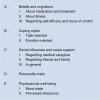Psychosocial predictors of non-adherence to chronic medication: systematic review of longitudinal studies
- PMID: 24851043
- PMCID: PMC4011900
- DOI: 10.2147/PPA.S47290
Psychosocial predictors of non-adherence to chronic medication: systematic review of longitudinal studies
Abstract
Objectives: Several cross-sectional studies suggest that psychosocial factors are associated with non-adherence to chronic preventive maintenance medication (CPMM); however, results from longitudinal associations have not yet been systematically summarized. Therefore, the objective of this study was to systematically synthesize evidence of longitudinal associations between psychosocial predictors and CPMM non-adherence.
Materials and methods: PUBMED, EMBASE, CINAHL, and PsychINFO databases were searched for studies meeting our inclusion criteria. The reference lists and the ISI Web of Knowledge of the included studies were checked. Studies were included if they had an English abstract, involved adult populations using CPMM living in Western countries, and if they investigated associations between psychosocial predictors and medication non-adherence using longitudinal designs. Data were extracted according to a literature-based extraction form. Study quality was independently judged by two researchers using a framework comprising six bias domains. Studies were considered to be of high quality if ≥four domains were free of bias. Psychosocial predictors for non-adherence were categorized into five pre-defined categories: beliefs/cognitions; coping styles; social influences and social support; personality traits; and psychosocial well-being. A qualitative best evidence synthesis was performed to synthesize evidence of longitudinal associations between psychosocial predictors and CPMM non-adherence.
Results: Of 4,732 initially-identified studies, 30 (low-quality) studies were included in the systematic review. The qualitative best evidence synthesis demonstrated limited evidence for absence of a longitudinal association between CPMM non-adherence and the psychosocial categories. The strength of evidence for the review's findings is limited by the low quality of included studies.
Conclusion: The results do not provide psychosocial targets for the development of new interventions in clinical practice. This review clearly demonstrates the need for high-quality, longitudinal research to identify psychosocial predictors of medication non-adherence.
Keywords: longitudinal studies; medication adherence; psychosocial factors; somatic and chronic diseases; systematic review.
Figures
Similar articles
-
Beyond the black stump: rapid reviews of health research issues affecting regional, rural and remote Australia.Med J Aust. 2020 Dec;213 Suppl 11:S3-S32.e1. doi: 10.5694/mja2.50881. Med J Aust. 2020. PMID: 33314144
-
Promoting and supporting self-management for adults living in the community with physical chronic illness: A systematic review of the effectiveness and meaningfulness of the patient-practitioner encounter.JBI Libr Syst Rev. 2009;7(13):492-582. doi: 10.11124/01938924-200907130-00001. JBI Libr Syst Rev. 2009. PMID: 27819974
-
The Effectiveness of Integrated Care Pathways for Adults and Children in Health Care Settings: A Systematic Review.JBI Libr Syst Rev. 2009;7(3):80-129. doi: 10.11124/01938924-200907030-00001. JBI Libr Syst Rev. 2009. PMID: 27820426
-
Psychosocial Variables That Predict Chronic and Disabling Tinnitus: A Systematic Review.Curr Top Behav Neurosci. 2021;51:361-380. doi: 10.1007/7854_2020_213. Curr Top Behav Neurosci. 2021. PMID: 33527333
-
Effectiveness of avatar-based technology in patient education for improving chronic disease knowledge and self-care behavior: a systematic review.JBI Database System Rev Implement Rep. 2019 Jun;17(6):1101-1129. doi: 10.11124/JBISRIR-2017-003905. JBI Database System Rev Implement Rep. 2019. PMID: 31021975
Cited by
-
Improving Medication Adherence and Health Care Outcomes in a Commercial Population through a Community Pharmacy.Popul Health Manag. 2016 Dec;19(6):454-461. doi: 10.1089/pop.2015.0176. Epub 2016 Apr 1. Popul Health Manag. 2016. PMID: 27035728 Free PMC article.
-
Effect of Interactive eHealth Interventions on Improving Medication Adherence in Adults With Long-Term Medication: Systematic Review.J Med Internet Res. 2021 Jan 8;23(1):e18901. doi: 10.2196/18901. J Med Internet Res. 2021. PMID: 33416501 Free PMC article.
-
Understanding the role of religious beliefs in adherence to antiretroviral therapy among Pentecostal Christians living with HIV in sub-Saharan Africa: a scoping review.BMC Public Health. 2023 Sep 11;23(1):1768. doi: 10.1186/s12889-023-16616-5. BMC Public Health. 2023. PMID: 37697279 Free PMC article.
-
Predictors of medication adherence: fact or artifact.J Behav Med. 2016 Dec;39(6):957-968. doi: 10.1007/s10865-016-9752-8. Epub 2016 Jun 15. J Behav Med. 2016. PMID: 27306683
-
Effectiveness of medication review: a systematic review and meta-analysis of randomized controlled trials.BMC Fam Pract. 2017 Jan 17;18(1):5. doi: 10.1186/s12875-016-0577-x. BMC Fam Pract. 2017. PMID: 28095780 Free PMC article.
References
-
- Ponieman D, Wisnivesky JP, Leventhal H, Musumeci-Szabó TJ, Halm EA. Impact of positive and negative beliefs about inhaled corticosteroids on adherence in inner-city asthmatic patients. Ann Allergy Asthma Immunol. 2009;103(1):38–42. - PubMed
-
- Venturini F, Nichol MB, Sung JC, Bailey KL, Cody M, McCombs JS. Compliance with sulfonylureas in a health maintenance organization: a pharmacy record-based study. Ann Pharmacother. 1999;33(3):281–288. - PubMed
Publication types
LinkOut - more resources
Full Text Sources
Other Literature Sources



